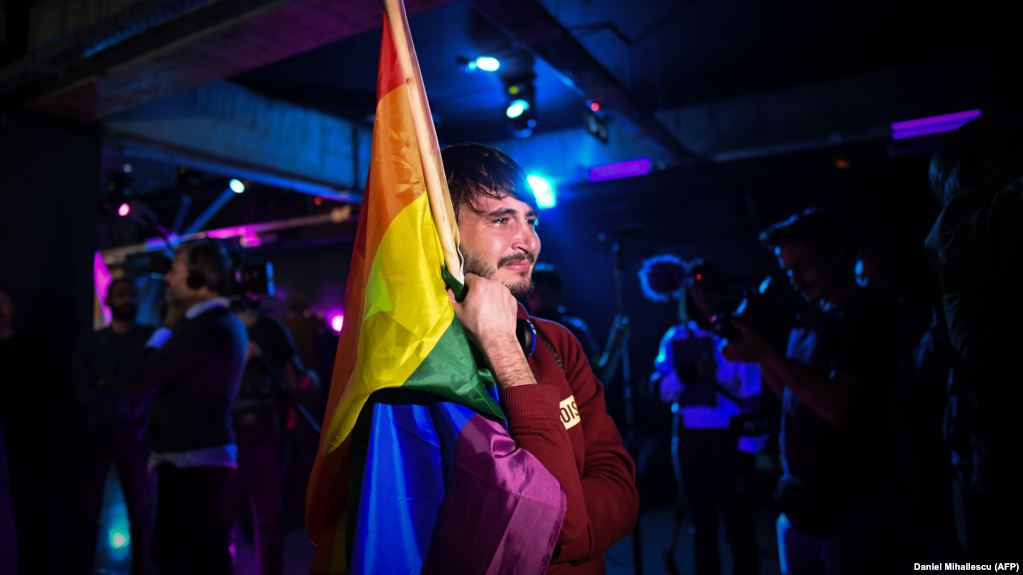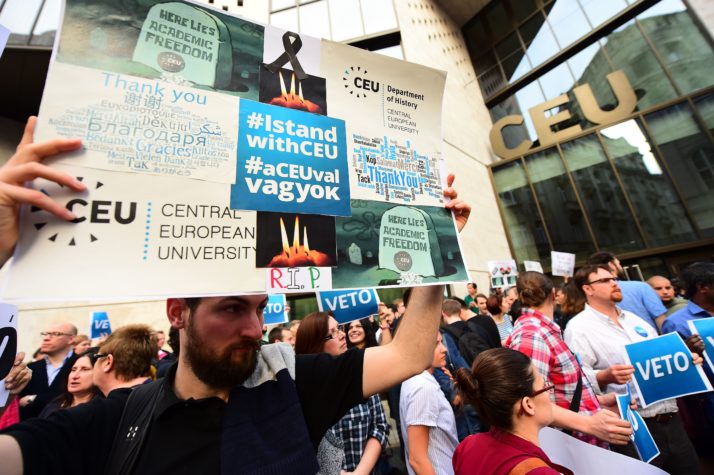Do you want to change the definition of marriage as a legal union “between a man and a woman” instead of the current gender-neutral definition “between spouses?” Romanians were asked this question a week ago, during a referendum on a constitutional change that could rule out same-sex marriage. While the turnout with just over 20 percent was too low for the referendum to be valid, it shows the increasing polarization in one of the youngest E.U. member states.
Regrettably, while E.U. anti-discrimination legislation is one of the most extensive in the world, it does not provide legal mechanisms to ensure that all of its members guarantee and protect equal human rights. Same-sex marriage is legal or about to be legal in almost half of the E.U. member states, while some others allow same-sex civil unions or other forms of recognition of same-sex couples.
At the same time, E.U. countries like Poland, Latvia, and Lithuania witness increasing conservatism, the promotion of “morality” and “traditional values,” and discrimination on the basis of sexual orientation and identity. Sadly, Romania’s referendum demonstrates that the country is following a similar path.
However, conservative and anti-LGBT (lesbian, gay, bi, and transgender) sentiments are not new to Romania. For example, in the 1990s, Romanian conservative and religious groups pleaded the government not to repeal the sodomy law, one of the requirements to join the European Union.
Changing the Constitution
Would citizens have voted in favor of the constitutional change, it would not only have complicated the recognition of same-sex unions in the future but made it close to impossible. Changing the constitution is a particularly difficult and long affair compared to the standard legislative process. Were the constitutional definition of marriage changed, it would have been very problematic to change it back and, even more so, to achieve the legalization of same-sex unions.
VIDEO: Romanians voted in a referendum on whether to alter the constitution to define marriage as explicitly between a man and a woman, in a move critics say will block same-sex marriage in the future https://t.co/itzN0sbcwT pic.twitter.com/Njd5lb0VTo
— AFP News Agency (@AFP) October 6, 2018
Currently, Romania does not recognize same-sex partnership or marriage, nor does it offer legal protection to same-sex couples. The sodomy law was abolished only in 2001, much later than in most Eastern European states.
Anti-LGBT Sentiments
The referendum of last weekend originated in a 2016 petition signed by three million Romanian citizens – more than enough to propose a constitutional change. It sharply demonstrates the anti-LGBT sentiments existing in the country.
The petition was introduced by the Coalition for the Family, a group of conservative non-governmental organizations with a goal of “promoting traditional family” and blocking the potential legalization of same-sex marriage. Romania is a religiously conservative country. Over 85 percent of the population is Orthodox and the role of the Orthodox Church in the political and social sphere is very significant. The latest initiative was strongly backed by the church.
In addition, the initiative could count on the support of politicians across the political spectrum. The Romanian debate is similar to the conservative discourse adopted in Russia that promotes “traditional values” and aims to prevent “propaganda of non-traditional sexual behavior” to children.
In an effort to gather votes in favor of the change, the Romanian government spent over $35 million on the referendum, opened ballots for two instead of one day, dropped the required participation from 50 to 30 percent, and relaxed anti-fraud monitoring. This demonstrates a strong bias of the Romanian government and politicians towards conservatism and against LGBT rights.
Homophobic referendum in #Romania failed. Good!
But outrageous that there was a referendum in the first place on curtailing rights of minorities. 🌈@RainbowRose_PES #LGBTI #ReferendumRomania
— Kati Piri (@KatiPiri) October 7, 2018
The idea of changing the constitutional definition of family is not novel for Romania. In 2008, the Romanian parliament voted for changes in the Civil Code to redefine the definition of marriage to the legal union “between a man and a woman.” Since all domestic laws must comply with the Constitution, the Code clarifies the constitutional term “spouses” to mean “a man and a woman.”
Such legislative initiatives present a risk of instigating further discrimination and homophobia in the country. The LGBT rights organization ILGA-Europe ranked Romania 25th out of 28 E.U. countries for discriminatory legislation and hate speech against LGBT people, with only Lithuania, Poland, and Latvia ranking worse.
Since the Coalition for the Family had started their campaign in 2015, Romania already saw an increase in violence and harassment on the basis of sexual orientation and identity, according to Romanian LGBT organizations. It is hard to estimate exact numbers since the police often do not report these incidents as hate crimes.
Opportunity for LGBT Community
At the same time, when there is the possibility of repression, citizens might mobilize and fight back. This can be observed in Romania where the potential ban of same-sex marriage provided an opportunity for the LGBT community. They organized more demonstration events with a higher number of protesters and gained extra support for the legalization of same-sex civil partnership.
The mobilization of LGBT Romanians could also prove useful in further developing the LGBT community and creating an increasingly LGBT-friendly environment. It may stimulate the creation of more LGBT groups and organizations. It is also helpful in providing extra safe spaces for socialization on the basis of these groups and organizations.
The referendum attracted public, domestic and international media attention to Romania. This level of attention offers LGBT Romanians a good opportunity to speak up about the state of LGBT rights, discrimination, and homophobia in their country and campaign for better legal recognition and protection of their rights. In addition, media exposure may help create more social acceptance of LGBT people.
The increased visibility could also help LGBT activists to establish connections with potential political allies to counter conservative forces present in the government. That would be expedient in improving LGBT rights through legislative initiatives and lobbying in the country that has far to go when it comes to LGBT rights.
Disclaimer: The views and opinions expressed here are those of the author and do not necessarily reflect the editorial position of The Globe Post.





















